
[adinserter block=”1″]
Did you know that there are certain yoga poses that improve concentration?
We’ve all been there: multitasking, endless to-do lists, and stimuli coming from every direction. These outside distractions drastically alter our ability to concentrate.
Need to focus right now? Breathing is the quickest way to bring your mind back to the present moment and task at hand. Try these one of these breathing exercises!
Attention deficit hyperactivity disorder (ADHD) increasingly affects our population as cell phones, TVs, tablets, laptops, and social media absorb our attention and distract us from being fully present in our day-to-day lives.
Constantly being bombarded by stimuli around us can make concentrating feel like an impossible task. Yet being mindful is key to living in the present moment, and presence is key to concentration and staying focused.
Thankfully, yoga can help. Bringing our awareness to the present moment and focusing our attention on our breath, the movement, and challenging poses will in turn improve our concentration.
How Yoga Can Help Improve Concentration
The physical practice of yoga is all about linking breath with motion and becoming fully present in mind and body. The practice itself is centered on concentration – focus on the breath, the alignment, and the movement.
By focusing your gaze on one spot, you can internally find equilibrium.
Balancing postures in particular are a great way to improve concentration. Balancing poses quite literally force us to concentrate on the present moment and the task at hand. With so many factors that could physically and metaphorically make us fall during balances, we are forced to become present, concentrate, and focus on these points to maintain our balance.
The Power of Drishti
Drishti is possibly the most important factor of balance poses. Meaning focus, drishti is the point where you shift your “gaze” during the yoga practice. Drishti is the practice of steadying your gaze.
Where your eyes go, your attention follows. This can mean both the literal place where you look or the metaphorical place that holds your attention (such as your intention). When your gaze begins to wander, so do your thoughts.
While performing balancing postures in yoga, it is super important to find a drishti and stick to it throughout the duration of the posture. I always recommend to my students to find a still, non-moving point in front of them (at eye level) where they can focus their gaze without altering it.
By focusing your gaze on one spot, you can internally find equilibrium. From there, you can focus your attention on just one thing. And honing in your attention allows you to concentrate so much better. This alone can improve concentration!
Practice These 10 Yoga Poses to Improve Your Concentration:
As you practice these poses, notice how they are actively challenging – and ultimately improving your concentration by requiring your full attention.
1. Tree Pose (Vrksasana)
The quintessential yoga balance, and a posture in which you’re standing on one leg, Tree Pose really requires attention and concentration to stabilize.
How to practice Tree Pose:
- Find Mountain Pose with your feet either touching or hip-distance apart
- Find your drishti by focusing your gaze on one still point on the floor
- Either draw your hands to your hips or bring your palms to meet at heart center
- As you inhale, lift your right foot off the floor
- As you exhale, externally rotate your hip so that your knee and your toes are pointing outward
- As you inhale, draw your foot to press into your inner left thigh (always be sure to avoid the knee joint)
- Reach your hands skyward
- Modify or intensify as you like, hold for five deep breaths, and then switch to the opposite leg
How to modify Tree Pose:
- Use a wall or stable surface to hold onto with one or both hands to stabilize your balance
- Instead of pressing your foot into your thigh, you can either place your toes on the floor with your heel pressing into your ankle or press the bottom of your foot into your left calf
How to intensify Tree Pose:
- You can keep your drishti where it is or shift your gaze to look upward or even try to close your eyes for a greater balance challenge
- Rise up onto the ball of your standing foot
2. Eagle Pose (Garudasana)
Another balance posture that requires you to stand on one leg, Eagle Pose twists and binds your entire body, forcing you to concentrate on the present moment.
How to practice Eagle Pose:
- Find Mountain Pose with your feet either touching or hip-distance apart
- Find your drishti by focusing your gaze on one still point on the floor
- Bring your hands to your hips
- Bend into your right knee as you lift your left leg up and over, crossing at the knees and crossing again at the calf and ankle
- Sink your hips toward the ground (as if you’re sitting low into Chair Pose)
- Open your arms out wide like wings and cross your right elbow beneath your left, bringing your palms to touch
- Modify or intensify as you like, hold for five deep breaths, and then switch to the opposite side
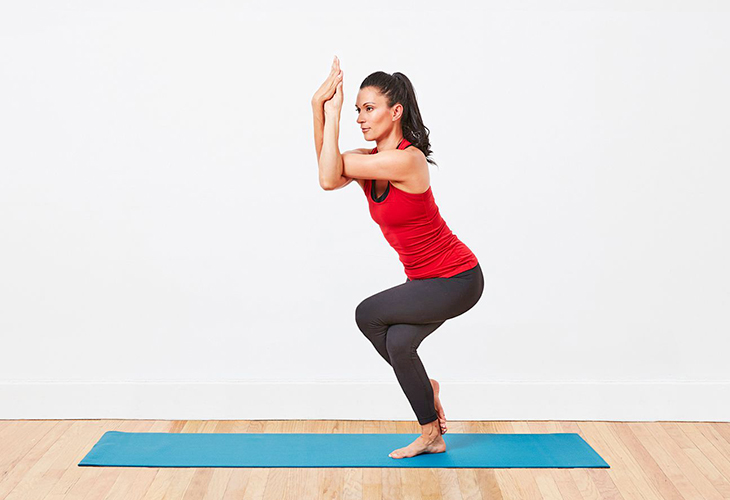
How to modify Eagle Pose:
- Use a wall or stable surface to hold onto with one or both hands to stabilize your balance
- Instead of double wrapping your foot around your calf, release your right toes to the mat like a kickstand (this will also help with balance)
- If you aren’t able to touch palms, keep the elbows crossed and bring your hands to opposite shoulders instead
How to intensify Eagle Pose:
- Sit lower into your seat, reaching your hips toward a low squat
- Work toward Sleeping Eagle Pose by rounding your back and drawing your elbows toward your knees
- You can keep your drishti where it is or shift your gaze to look upward or even try to close your eyes
- You can rise up onto the ball of the foot on your standing leg
3. Warrior III (Virabhadrasana III)
This flying warrior pose requires focus and concentration as you stabilize your body on one leg and draw your torso parallel to the floor. This challenging balancing yoga pose improves concentration big time!
Just like your gaze, if your thoughts start to wander, you may lose your balance. Find a mental and visual drishti (a focus point to set your gaze/thoughts on).
How to practice Warrior III:
- Start in Mountain Pose with your feet either touching or hip-distance apart
- Find your drishti by focusing your gaze on one still point on the floor
- Either draw your hands to your hips or bring your palms to meet at heart center
- Lift your right knee hip level, engage your core, and begin to kick the right foot out behind you as you hinge your torso forward
- Find your final expression by extending your arms out in front of you
- Modify or intensify as you like, hold for five deep breaths, and then switch sides
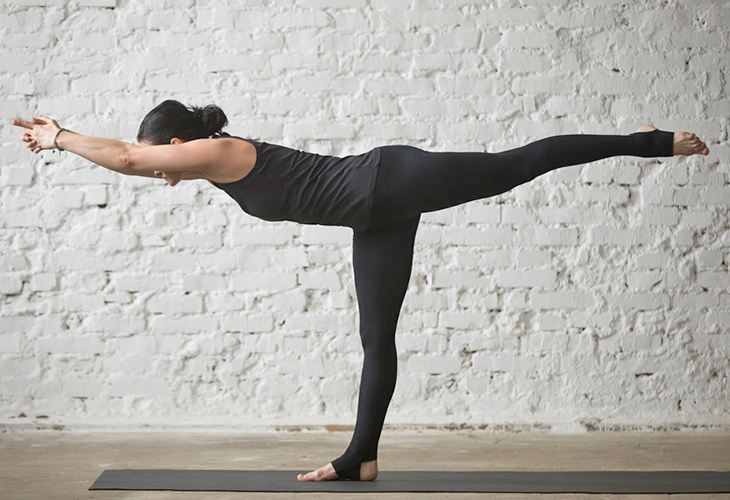
How to modify Warrior III:
- Use a wall or stable surface to hold onto with one or both hands to stabilize your balance
- Instead of reaching your arms forward, you can place them onto yoga blocks in front of you or keep them at heart center, or spread them out like airplane wings (which helps with balance)
How to intensify Warrior III:
- For an added balance challenge, try closing your eyes
- Take a reverse prayer with your hands behind your back
4. Half Moon Pose (Ardha Chandrasana)
Another one-legged balance, Half Moon works the hips in the opposite direction of Warrior III, creating openness within the hip joint and concentration of the mind.
How to practice Half Moon Pose:
- Find Mountain Pose with your feet either touching or hip-distance apart
- Find your drishti by focusing your gaze on one still point on the floor
- Hinge from your hips to come into Standing Forward Fold
- Plant your left fingertips at the top left corner of your mat and bring your right hand to your right hip
- Lift your right foot up off of the floor and bring your right leg to hip level
- Externally rotate your hip so your right hip stacks on top of your left. Keep both legs straight and strong
- Lift your right arm skyward, making one long line between both arms, and shift your gaze skyward
- Modify or intensify as you like, hold for five deep breaths, and then switch sides
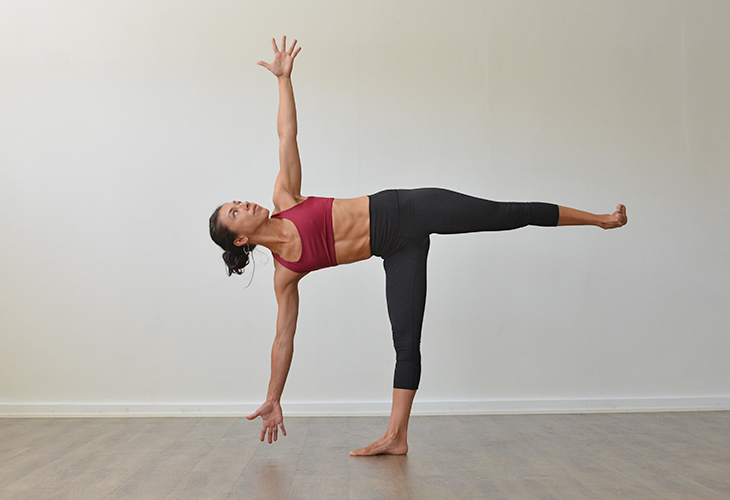
How to modify Half Moon Pose:
- Use a wall or stable surface to hold onto with one or both hands (or press your hip against the wall or kick your foot into the wall) to stabilize your balance
- Instead of reaching your arm to the sky, leave it on your hip
- Instead of placing your fingertips on the floor, place them on a yoga block to bring the floor closer to you
- Instead of shifting your gaze skyward, keep your drishti in the original spot you chose
How to intensify Half Moon Pose:
- For an added balance challenge, try closing your eyes
- Try bringing your bottom hand to shin or for an even bigger balance challenge, lift your fingertips up off the floor
5. Dancer’s Pose (Natarajasana)
This balancing backbend takes a whole lot of focus and attention to detail to create openness and expansion while maintaining balance on one leg. Needless to say, concentration is essential to practice this pose, and as a result will improve concentration.
How to practice Dancer’s Pose:
- Find Mountain Pose with your feet either touching or hip-distance apart
- Find your drishti by focusing your gaze on one still point on the floor
- Bring your right arm out to the side like you’re holding a tray. Bend into your right knee and grab onto your right foot
- Square your hips toward the top of your mat and draw your knees toward each other as you reach your left arm skyward
- Begin to kick your right foot into your hand as you hinge your torso forward
- Expand your chest forward and kick back with the same amount of energy that you reach forward
- Modify or intensify as you like, hold for five deep breaths, and then switch sides
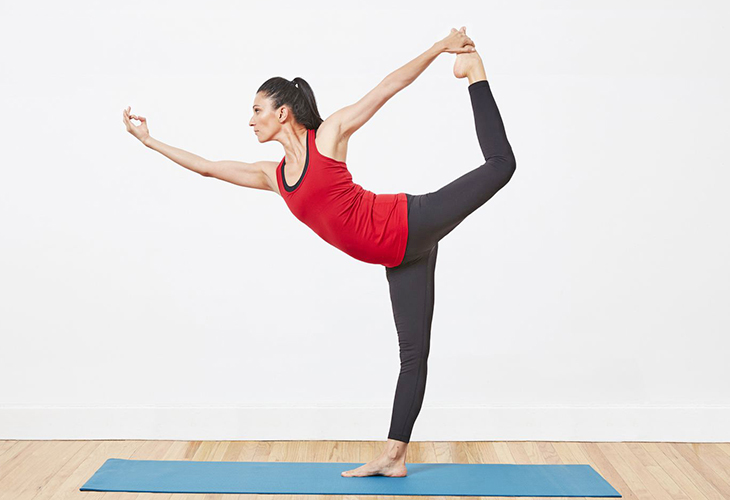
How to modify Dancer’s Pose:
- Use a wall or stable surface to hold onto with one or both hands to stabilize your balance
- Start with holding your foot in your hand and standing upright to find your equilibrium before advancing
How to intensify Dancer’s Pose:
- Shift your gaze to look upward or even try to close your eyes
- Work toward a full Standing Split within the backbend, trying to straighten your lifted leg as much as possible
- Practice flipping your grip and hold onto your back foot with one or both hands reaching up over your head.
Interested in learning how to flip your grip? Practice these 8 Yoga Poses to Help You Flip Your Grip
6. Extended Hand-to-Big Toe Pose (Utthita Hasta Padangusthasana)
As if balancing on one leg isn’t hard enough, this posture kicks it up a notch requiring strength, flexibility, and a big dose of concentration.
How to practice Extended Hand-to-Big Toe Pose:
- Find Mountain Pose with your feet either touching or hip-distance apart
- Find your drishti by focusing your gaze on one still point on the floor
- Bring your hands to your hips.
- Lift your right leg hip level and grab your right big toe with your peace sign fingers
- Begin to straighten your right leg forward away from your body, maintaining a tall spine and engaged core
- Modify or intensify as you like, hold for five deep breaths, and then switch sides
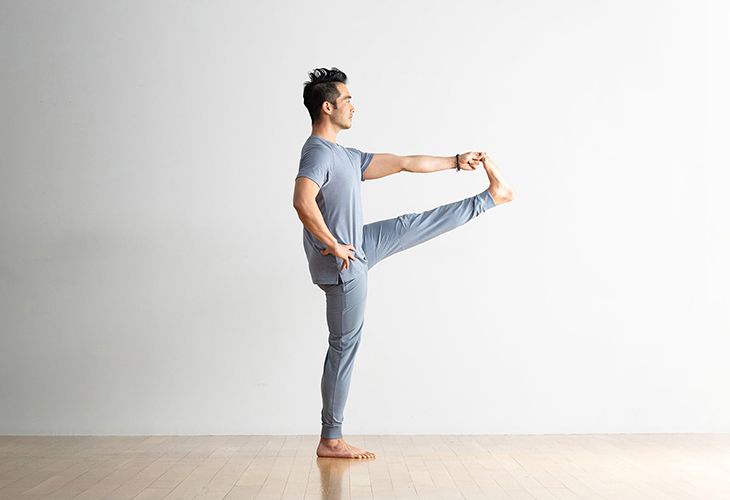
How to modify Extended Hand-to-Big Toe Pose:
- Use a wall or stable surface to hold onto with one hand to stabilize your balance
- Instead of holding your big toe, use a yoga strap around the ball of your foot
- Instead of straightening your leg, you can keep the knee bent as much as needed
How to intensify Extended Hand-to-Big Toe Pose:
- Try reaching your free hand skyward
- Shift your gaze skyward or even try to close your eyes
- Fold forward over your extended leg
7. Side Plank (Vasisthasana)
This balance pose has two points of contact with the floor (the feet and one hand), but that doesn’t make it any easier . . . Requiring considerable focus to stabilize and align, this pose is a true test of awareness and can help improve concentration.
How to practice Side Plank:
- Find Plank Pose with your feet touching and shift your weight into your right hand
- Find your drishti by focusing your gaze on one still point on the floor
- Roll to the pinky side of your right foot and stack your left foot on top of it
- Press the floor away from you and lift your hips as you reach your left arm skyward
- Modify or intensify as you like, hold for five deep breaths, and repeat on side two
Need a refresher for your alignment in Plank Pose? Read How to Correctly Perform Plank Pose
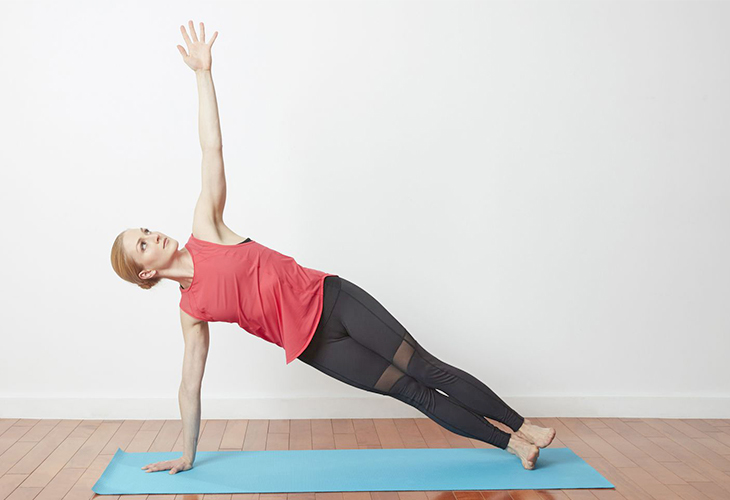
How to modify Side Plank:
- Instead of stacking your feet, drop your right knee to the mat
- Bring your right forearm to the ground instead of your right hand, taking Forearm Side
- Plank instead
How to intensify Side Plank:
- Bring your left foot to you right thigh, making a Tree Pose shape with your legs
- Bring peace sign fingers to your left big toe and extend your leg straight up toward the sky to find the full variation of the pose
- Shift your gaze skyward or even try to close your eyes
8. Crow Pose (Bakasana)
This challenging yet accessible arm balance requires attention to many details of alignment within the body, forcing concentration and complete presence within the moment.
How to practice Crow Pose:
- Start in a Forward Fold with your feet touching and bend your knees until your palms can comfortably touch the floor
- Bring your palms shoulder-width apart and spread your fingers wide
- Bend into your arms and rise to the balls of your feet as you create a shelf with your knees on your upper arms, bringing them in as close to your armpits as possible
- Squeeze your legs into the midline
- Find your drishti by focusing your gaze on one still point on the floor
- Round your back and strongly engage your core as you lean your weight forward until your feet become light and start to lift from the floor
- Draw your heels in toward your seat and press the floor away from you
- Modify or intensify as you like and hold for five deep breaths
New to Crow Pose? Then this Crow Pose Tutorial Video is what you’re looking for!
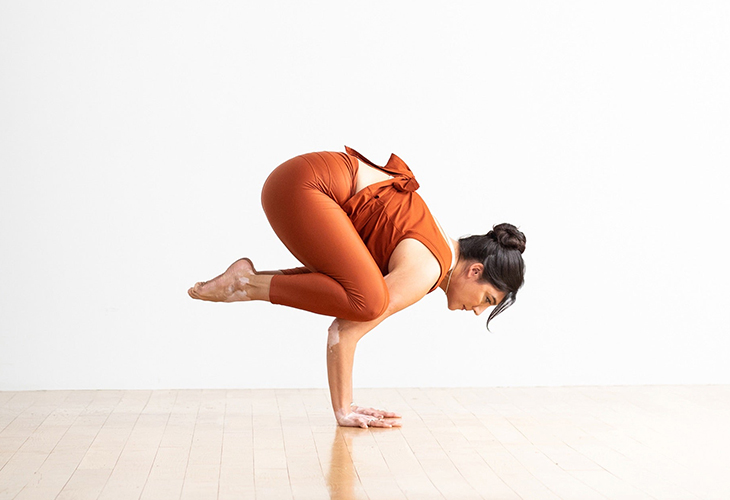
How to modify Crow Pose:
- Place a yoga block in front of your face – it can act as a safety net or you can rest your forehead on it for added support
- Keep your feet on the mat and practice lifting one toe off the mat at a time to get a feel for the balance aspect
How to intensify Crow Pose:
- Straighten your arms by firmly pressing the floor away and lifting your hips high, finding Crane Pose
- For an added balance challenge, try closing your eyes
9. Headstand (Salamba Sirsasana)
Turning upside down and balancing on your head is a true test of concentration and present moment awareness (the key to improving concentration!) since you need to steadily focus your attention fully on the task at hand.
How to practice Headstand:
- From Table Top, bring your forearms to the floor and grab opposite elbows to make sure your arms are shoulder-width apart. Release your elbows and interlace your fingers
- Plant the crown of your head between your arms and lengthen your neck. Your palms should create a basket for the back of your head
- Lift your knees off the floor and walk your feet as close to your head as you can, working to stack your hips over your shoulders
- Actively engage your core and draw your right knee in closely toward your chest
- Without jumping, draw your left knee in closely toward your chest
- Hugging both legs together, slowly extend them up toward the sky, pressing the floor away with your forearms
- Modify or intensify as you like, hold for five deep breaths, and then rest in Child’s Pose
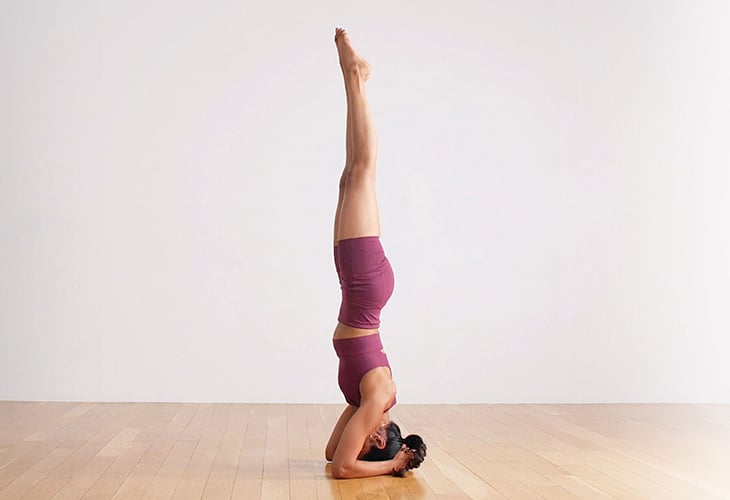
How to modify Headstand:
- Use a wall behind you to stabilize your balance
- Instead of lifting your feet off the floor, keep them on the ground and focus on engaging your core and pressing up out of your forearms
How to intensify Headstand:
- You can keep take any arm and/or leg variations that you like (like an Eagle Leg wrap)
- For an added balance challenge, try closing your eyes
10. Forearm Stand (Pincha Mayurasana)
Likely one of the most challenging of all balance postures, inverting and balancing solely on your forearms definitely requires intense concentration to be able to achieve.
How to practice Forearm Stand:
- Start in Dolphin Pose (either with your forearms shoulder-width apart and pressing down into the floor or with your elbows shoulder-width apart and your palms pressing together) and lift your right leg skyward
- Step your left foot about halfway up toward your hands and rise onto the ball of that foot
- Find your drishti by focusing your gaze on one still point on the floor
- Engage your core and lift your left leg off the floor, drawing your legs to meet directly aligned over your shoulders
- Actively press the floor away from you with your forearms and send energy up through your feet, keeping your legs strong and active
- Modify or intensify as you like, hold for five deep breaths, and then switch to kick up with the opposite leg
New to Forearm Stand? Practice These 4 Yoga Poses to Help You Prepare For Forearm Stand
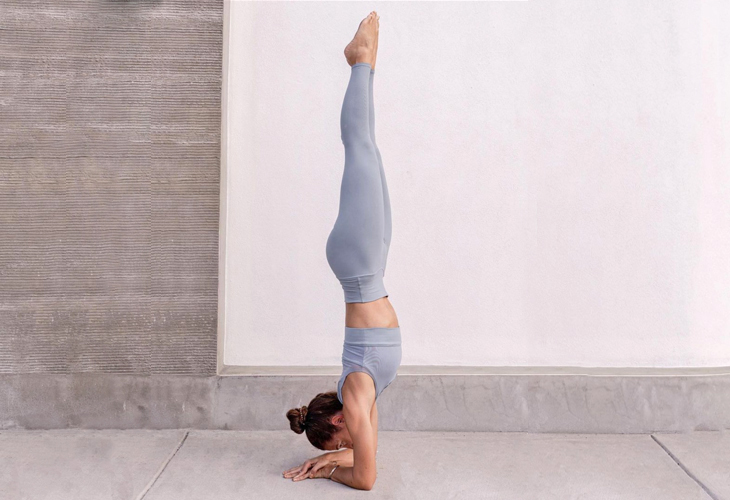
How to modify Forearm Stand:
- Use a wall behind you to stabilize your balance
- Instead of kicking up, you can focus on engaging your core and stabilizing your arms simply by holding Dolphin Pose or One-Legged Dolphin Pose
- Take little hops floating up just slightly off the floor (instead of fully bringing your legs and hips over your shoulders)
How to intensify Forearm Stand:
- Try different leg variations
11. Concentration Bonus! Meditation
A final yoga-based method of cultivating more focus and improving concentration is through meditation. If you already have a steady meditation practice, awesome! And if not, no worries. Even sitting quietly in Lotus Pose or cross-legged and focusing on your breath is an excellent way to increase mental clarity and focus.
You can learn all about the centering benefits of meditation by reading about the Important Benefits of Meditation on the Brain
The Full Benefits of Practicing Yoga to Increase Concentration
Finding balance in our yoga practice symbolically allows us to find balance in our daily lives. When we are able to focus and concentrate on the mat, that can equate to us being able to focus and concentrate off the mat as well.
The next time you find yourself unable to concentrate, I invite you to practice some or all of the poses above to bring yourself back into the present moment, allowing your focus and concentration to improve and become a greater part of your daily life.
[adinserter block=”1″]
Credit : Source Post






